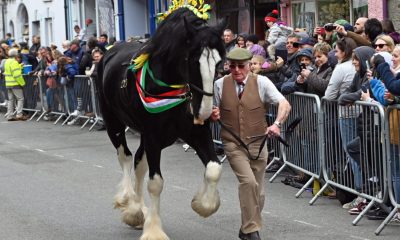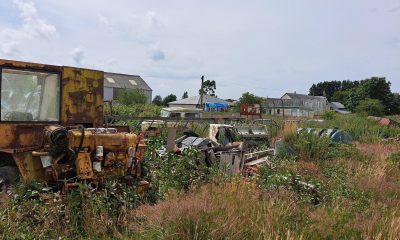Farming
The changing role of women in farming today

“Why can’t women be farmers in their own right?”: Rachael Davies
TO CELEBRATE International Women’s Day, the Farmers’ Union of Wales explored what working in the agricultural industry is like for women today.
Working in partnership are husband and wife team Geraint and Rachael Davies.
Speaking about her perception of women in farming, FUW member Rachael Davies, who farms 1,200 acres in Bala, Gwynedd, carrying 1,000 breeding ewes with 200 replacements and 30 suckler cows, in partnership with her husband Geraint, said: “Farmer’s daughter, farmer’s wife – why can’t women just be farmers in their own right rather than be defined by the nearest man who happens to farm?
“Women’s role within the agricultural industry has definitely changed in the past ten years with women being more openly and publicly involved, however, there is still some distance to go. Women have been grafters and decision-makers on family farms for centuries yet in the 21st century, we are still in the position of having to ‘prove’ ourselves or occasionally becoming pseudo-masculine to do so.”
She adds that one of the most frustrating questions to be asked as a mother of two daughters is ‘wouldn’t it be nice to have a boy, for the farm?’ But she is determined to get involved, lead by example and highlight that women are just as capable as men within the agricultural industry, both physically and intellectually.
“I urge women to get involved, make things more integrated, let’s encourage, engage – women have the skills that modern farming needs; we are natural multi-taskers, good communicators and used to hard work. More women need to be involved steering the direction of the industry; feeding into stakeholder groups who are still dominated by men, usually of a certain age and demographic,” adds Rachael.
Supporting her views is husband and FUW Meirionnydd County Vice Chairman, Geraint Davies. He said: “Behind every great man there is a greater woman, or so my grandmother has always told me. Until my grandparents retired in 2000 my grandmother kept the farm going through fuel for the men, the kettle was never far off boiling point on the Rayburn and a meal ready on the table.”
He recalls that the farmhouse was her domain and his grandmother was not involved in much of the decision making of the day to day running of the farm. The next generation, his parents, followed a similar suit with his mother being chief cook and bottle-washer but with slightly more involvement in the decision-making but not beyond the kitchen doorstep.
“Rachael started how she meant to go on by farming outside with me as well as making all decisions with me, no matter how small or big. Our business is very much based on partnership but we don’t necessarily always agree. I welcome her views and the challenges to my ideas and it works for our business. Rachael, like many modern farming women juggles employment off farm and family life alongside running the business. I now have two daughters and I see a bright future for them in farming (if they choose). I think farming needs more women involved: I’m fed up dealing with negative old men,” added Geraint.
But what is it like to be in charge of a farm holding with no men around? We spoke to FUW Brecon and Radnor administrative assistant Kath Shaw, who also farms 80 acres in Radnorshire in partnership with her mother, where they run a herd of red deer.
Kath and her mum Fran run the 80 acre deer farm together.
Kath completed an HND in Agriculture at Myerscough College and an AND in Deer Management at Sparsholt College and has worked in the deer industry ever since, setting up her own deer herd in 2004. Kath was born and grew up near London and whilst she did not come from a farming background, she was always encouraged to be outside and nurtured a healthy obsession with horses until the age of 16.
“Being a woman in agriculture has advantages and disadvantages. I have experienced low-level sexism in the industry throughout my working life, but have always deflected it with humour and if that hasn’t worked, by confronting the individual concerned.
“On the plus side, being a woman in a male dominated field has made me more memorable. In the last ten years farming has changed to become less focused on brawn as people are more aware of the importance of sensible working practices. This has benefited everyone as machinery becomes more sophisticated and equipment is developed to help with the heavier jobs. There is always a solution to a problem that doesn’t involve lifting heavy weights by hand!”
Kath also believes that the future of agriculture depends on people working as a team, be they male or female. She added: “Women have always worked in the background on farms. It is often the women who feed and check the stock while their husband goes off to do a day’s work somewhere else and I see no reason why they shouldn’t take a more prominent position on the farm.
“True, it is not very glamourous and you are unlikely to find a female farmer with a perfect French manicure or the latest designer clothes but the job satisfaction is huge and it’s so much better than sitting in an office, staring at the same four walls every day.”
Women also play a supportive role on farm. They offer a shoulder to cry on, an ear that listens.
Anwen Hughes, the FUW’s Ceredigion County Chairman and Younger Voice for Farming Committee vice chairman, farms around 138 acres, of which 99 acres are owned, 22.5 acres are on a lifetime farm tenancy and a further 17 acres are rented.
She keeps 100 pedigree Lleyn sheep, 30 purebred Highland sheep and 300 cross bred Lleyn and Highland ewes and has been farming since 1995 at Bryngido farm, just outside of Aberaeron in Ceredigion.
Anwen runs the farm on her own. In the current financial climate the farm business doesn’t make enough money to sustain more than one wage, so it’s up to Anwen to take care of the home farm.
She said: “Growing up around men in the agricultural industry I have found that as a woman you have to earn respect and make a man listen. You have to prove and show that you know what you are talking about. That can be quite intimidating at the start but by now I have no problem turning up to a meeting full of men. Money on farms has got tighter, so many farmers are turning to their wives for help on the farm.”
However it’s not all about being tough Anwen says. She thinks that women add a much needed soft touch to an industry that can be harsh and unforgiving in so many ways. She says “Women also play a supportive role on farm. They offer a shoulder to cry on, an ear that listens and are often in charge of the paperwork too. I think the role of women has changed dramatically over the years, with many of us also having to run the business side of things, look after the children and keep the household going.”
Managing Partner at AgriAdvisor, Dr Nerys Llewelyn Jones said: “In the Welsh agricultural industry the role of women within farming businesses is evident, with men and women working side by side in farming family businesses for decades in a manner to which other industries still aspire.
“A sustainable farming industry will need to encourage those with other skills and expertise to work within agriculture.”
“Were you asked to draw a picture of a farmer, the majority would surely draw a male character with a flat cap, a check shirt and wellingtons. This image is now a stereotype and those of us who have grown up within the industry and who have seen the inner dynamics of how a farming business works know that most major business decisions are decided around the kitchen table with input from all who work within the business, both male and female.
“The perceived barrier of the physical nature of farm work making it more ‘suitable’ for men, is becoming a myth, dispelled further by the increased availability and use of technology and innovation on farms. A sustainable farming industry will need to encourage those with other skills and expertise to work within agriculture and therefore women who may have had to work off-farm to supplement incomes will be in an excellent position to bring those additional skills to the farming table.”
“Things have changed, we have achieved the roles we hold due to our ability, our focus and drive.”
Alison Harvey, Agriculture Manager for Lamb at Dunbia, said: “I don’t feel as though I have to ‘deal’ with being a woman in the farming industry. This time has passed in Wales, we have moved on. Things have changed, we have achieved the roles we hold due to our ability, our focus and drive.
“My role means I work with farmers and retailers and I have never felt that being a women has either helped or hindered what I do. You have to work to gain experience and knowledge, and with this, people will respect you more – but this is about age and experience rather than being a woman.
“Women have been a vital role in farming for a lot longer than I have been around, it doesn’t matter what the role has been on the farm, and the fact is that women have always been important to agriculture. The best businesses I have come across have been partnerships, each knowing their strengths and weaknesses and working together to get the best from one another.”
The main change Alison thinks, and not just for women in agriculture, has been education: “Women have gone to University, or college, or to work in another business, and they have brought what they have learnt back to the business at home, or developed careers in particular areas.
“This is where I see most potential for agriculture, getting new skills into the business. As a result of their education women have more prominent roles in agriculture, we see women in roles that have traditionally had men in them. It is equality and balance that seems to work best, not one sex overpowering another, this is what we should aim for.”
RABI Wales Regional Manager Linda Jones said: “Many more women are embracing the opportunities available to them in farming than a decade ago. Farming has been traditionally viewed as a male-dominated industry but increasingly, women are choosing to immerse themselves fully in the farm business rather than settling for the roles of chief cook, bottle-washer and VAT returns person.
“Many more women are embracing the opportunities available to them in farming than a decade ago.”
“Women realise the importance of acquiring new knowledge, keeping up with technology and ‘up-skilling’ and are adept at finding new ways and opportunities to make money for the business. Diversification is another key area where women can excel. Their ability to think outside the box and not rely on traditional ideas can be inspiring.
“Women are the driving force behind many successful farming businesses, but their significant contribution is not always readily acknowledged outside the four walls of the home. Pride is such a major issue in the farming industry and I see this with my work for the farming charity, the Royal Agricultural Benevolent Institution (R.A.B.I). Pride prevents many farming people who are struggling financially from picking up the telephone and calling our Freephone helpline 0808 281 9490. Our work is strictly confidential but very often it is the woman of the farm who has the courage and strength to call the helpline and ask for help.”
Farming
E-Tickets now on sale for Pembrokeshire County Show 2024

E-TICKETS are now on sale for this summer’s Pembrokeshire County Show, the largest county agricultural show in Wales. Preparations are coming together well for what is set to be a fantastic two days of livestock, competitions, attractions and much more.
General entry tickets for the show, taking place on Wednesday and Thursday, 14 & 15 August, are now available at an ‘early birds’ rate online from the website. Ticket prices have had to increase slightly to cover costs but still remain below 2019 charges. The early bird rate for Adults is £15, children £8 (5-16 years), Carers as well as children four years and under are free. Please visit: www.pembsshow.org to purchase your e-tickets.
Adam Thorne, President of Pembrokeshire Agricultural Society said, “At the event in August visitors will be able to tickle their tastebuds in the Castell Howell Food Hall, marvel at the livestock classes, enjoy watching the dog agility, be wowed by the showjumping, explore the horticulture, arts and crafts entries.
Shop ‘til they drop in the Country Market area, which will showcase over 40 quality local and award winning product and craft stalls and much more.”
Pembrokeshire Agricultural Society Membership packages are also available and these include admission to the Show and the Members’ Area. Purchasing membership of the society will support its aim to promote, advance and improve agriculture, horticulture and rural crafts and skills by the improvement of livestock and the demonstration and showing of livestock, machinery, crafts, products, methods and processes connected with agriculture and agricultural education in particular by the holding of an annual show. Full details are available on the website: Become A Member | Pembrokeshire County Show | Pembs Agricultural Society (pembsshow.org)
Putting together this event is hard work and requires an enormous effort by the staff, volunteers and trustees of Pembrokeshire Agricultural Society. The Society is indebted to so many for their commitment and support in helping host the event.
A special mention must go to the county show sponsors. Pembrokeshire Agricultural Society is proud to have many local, regular, sponsors who make the event possible.
Sponsorship Director, Richard Cole, said, “Sponsorship and Pembrokeshire County Show have been a successful combination for the last 45 years. Sponsors have enjoyed promoting their businesses through the varied mediums of banners, announcements, show rings, buildings, equine and livestock classes and championships over the years. It isn’t too late. If you’d like to discuss becoming a corporate sponsor please complete the form on our website: www.pembsshow.org.”
Farming
Pembrokeshire Agricultural Society in search for county’s top progressive farmers

IF you farm in Pembrokeshire and can demonstrate your farm’s use of the latest technological methods to promote progressive, sustainable agriculture then the Pembrokeshire Agricultural Society encourage you to enter the prestigious Baron de Rutzen Award.
Adam Thorne, Pembrokeshire County Show President, said, “We are looking for local Pembrokeshire farmers, under the age of 45, who can demonstrate their farm’s use of the latest technological methods to promote progressive, sustainable agriculture. They also need to show consideration for the environment and habitat sensitivity on their farm as well as present an aesthetically pleasing example of farming in the county. The competition welcomes all livestock and arable sectors to take part.”
Last year’s winners of the Award were Mark and Caroline Davies of Little Newcastle, Haverfordwest. They milk 230 pedigree Holsteins through a fully automated system. They rear their own replacements and also have a small beef enterprise. The farm is all grassland and they follow a strict reseeding and liming policy to optimise the yield from their multi-cut silage system. The couple place significant emphasis on animal health, husbandry and breeding to maximise the efficiency of their system.
Baron John Fredrick De Rutzen was President of Pembrokeshire Agricultural Society in 1936 and the Baron de Rutzen Trophy was produced in his memory. The third Baron served in the Welsh Guards and tragically died, aged 36, in 1944.
This year’s entrants must be fully practising farmers within the county of Pembrokeshire and were under the age of 45 years on 1 January 2024. Entries can either be by nomination or direct application online on the Pembrokeshire Agricultural Society website. Click here to apply: Baron de Rutzen Award | Pembrokeshire County Show | Pembs Agricultural Society (pembsshow.org)
The closing date for nominations and applications is at noon on Wednesday, 29 May 2024.
Farming
Pembrokeshire Agricultural Society elect new president

ARABLE and beef farmer, Adam Thorne, has been unanimously elected to become the new President of Pembrokeshire Agricultural Society for the year ahead. Adam is the third generation of his family to hold the position.
During the Annual General Meeting of Pembrokeshire Agricultural Society, held last week on the Pembrokeshire Showground, Mr Tim John and his wife Margaret John were also voted in as Presidents elect.
Adam Thorne has had a long association with Pembrokeshire Agricultural Society. After visiting the show as a toddler, then helping show the family’s pedigree Herefords, his uncle got him into helping him with stewarding in his early teens. From there he progressed to being a Steward with his own section, Commercial Cattle, and then also the Butcher’s Lambs section.
From stewarding, Adam became involved with committee work, starting as an Executive and then on to the former Finance and General Purposes Committee. He has been Chairman of the Estates Committee for 12 years and is now a Board member and a Trustee.
Adam said, “I am proud of my long association with Pembrokeshire Agricultural Society. I am the third generation to now be President, following my late grandfather, Walter Thorne, my father, Robert Thorne and more recently my uncle, George Thorne. I am looking forward to my year in the prestigious position.”
Away from his work with the society, Adam runs the family’s arable and beef farm in Robeston West, Milford Haven. He has been heavily involved with Tiers Cross YFC from an early age, having been Club Secretary twice and Chairman. He has also sat on Pembrokeshire County YFC Committees and the Wales YFC Rural Affairs Committee.
The 2024 Pembrokeshire Agricultural Society officeholders, announced at the AGM, include Miss Ffion Edwards who was awarded the role of Ambassador at last year’s show. Ffion, a nurse from Maenclochog, has enjoyed many years of attending the county show and believes that there are so many good elements to it. Ffion has been a member of Llysyfran YFC for 15 years and enjoys every aspect of young farmers – trying new experiences, competing and travelling to name a few. Mrs Nicola Owen was also elected as the Honorary Treasurer.
Brian Jones, the outgoing Pembrokeshire Agricultural Society President, took the opportunity to thank everyone who had helped and supported him throughout his presidency. During his year as President, Brian and his wife Helen, raised a tremendous amount of money for various charities including the Pembrokeshire Agricultural Society, RABI, Tir Dewi and the DPJ Foundation. Brian also gave his assurances that Castell Howell will continue to sponsor the Food Hall for future years.
Pembrokeshire County Show, the largest county agricultural show in Wales, will be held over two days again this summer on 14 and 15 August. Everyone is invited to attend the celebration of rural life in the county.
Pictured (left to right): Ffion Edwards the Ambassador for 2024; Adam Thorne, President; Margaret and Tim John, the Presidents Elect.
-

 News4 days ago
News4 days agoPolice and air ambulances at ‘serious incident’ at West Wales school
-

 Business2 days ago
Business2 days agoLargest Welsh port appoints communications and marketing director
-

 Crime4 days ago
Crime4 days agoPembrokeshire pensioner accused of 17 sexual offences against children
-

 Crime3 days ago
Crime3 days agoAll three school stabbing victims discharged from hospital, police confirm
-

 Community6 days ago
Community6 days agoCounty Hall to offer space for community banking
-

 Crime6 days ago
Crime6 days agoBrian Davis: Wanted on suspicion of commercial burglary
-

 Sport6 days ago
Sport6 days agoSwifts eyes on double.
-

 Community2 days ago
Community2 days agoSuspected explosive device found on west Wales beach























